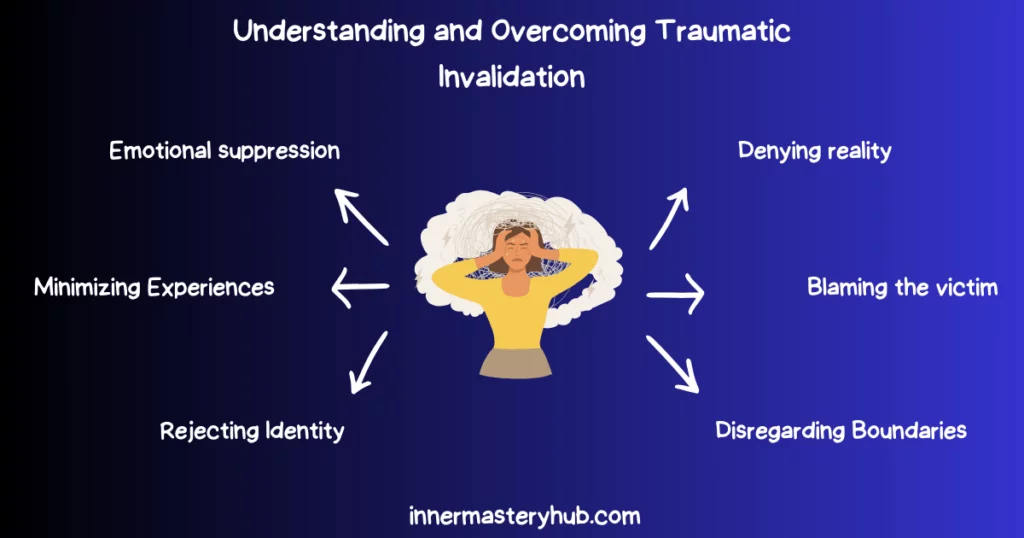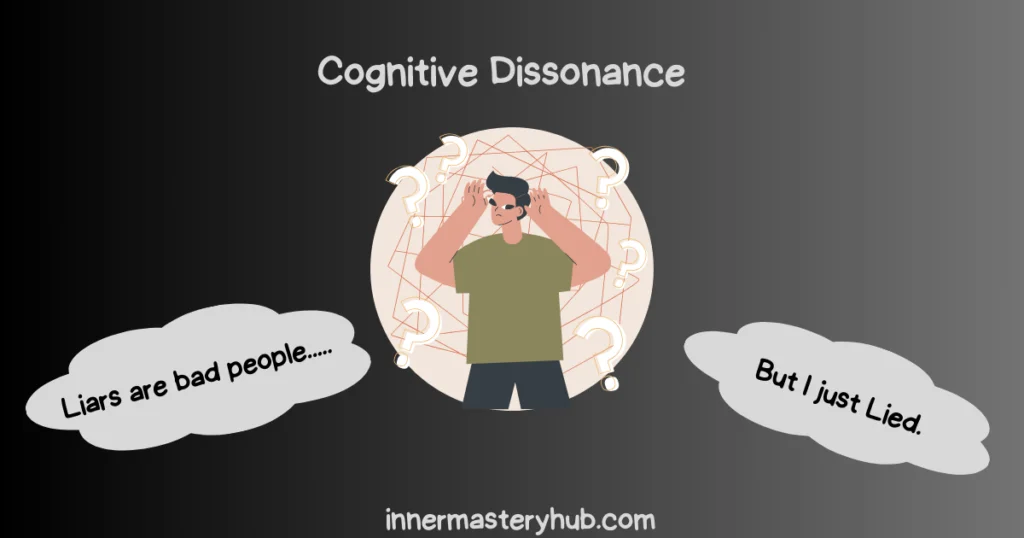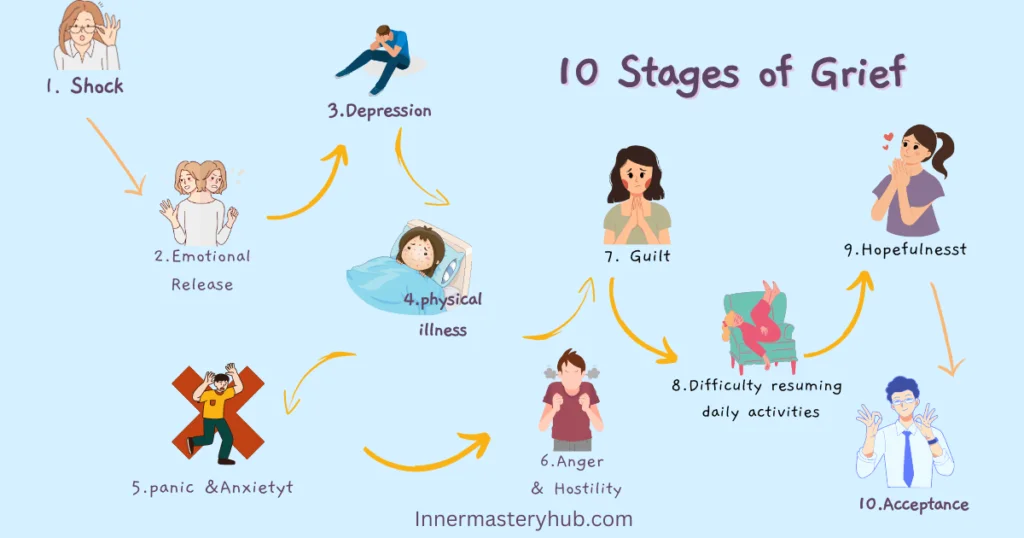
A form of emotional abuse known as “traumatic invalidation” is when someone’s ideas, emotions, or experiences are invalidated, rejected, or ignored by close ones. This can occur anywhere, but carers or other individuals in positions of authority frequently go through it when their children are young. The effects of traumatic invalidation can be substantial and long-lasting, resulting in symptoms like shame, PTSD, and stress.
However, expressing your feelings and being invalidated or told you’re exaggerating or unreasonable might hurt. People invalidating you might lower your self-esteem and mental well-being.
Traumatic invalidation is extreme or continual social invalidation. Your feelings, experiences, and memories might be disregarded or rejected. Intentional or not, severe and frequent invalidation can produce post-trauma stress.
RELATED: Understanding Enmeshment Trauma
Table of Contents
Examples of Traumatic Invalidation
Traumatic invalidation can have a profound and lasting impact on a person’s mental health, leading to feelings of shame, self-doubt, and emotional dysregulation. Here are some examples of traumatic invalidation can include:
1. Dismissing Emotional Expression
Emotional invalidation is when your feelings and emotions are not recognized by your loved ones as;
- “You’re overreacting.”
- “Don’t be such a baby.”
- “You’re being too sensitive.”
2. Minimizing experiences
- “That was nothing compared to what I’ve been through.”
- “You’re making a big deal out of nothing.”
- “You should just get over it.”
3. Denying reality
- “That never happened.”
- “You’re imagining things.”
- “You’re mistaken.”
4. Blaming the victim
- “You brought this on yourself.”
- “It’s your fault.”
- “You’re overreacting.”
5. Silencing or Discouraging Communication
- “Don’t talk about it.”
- “No one wants to hear about your problems.”
- “Keep your thoughts to yourself.”
6. Disregarding Boundaries or Preferences
- “You’re being unreasonable.”
- “You should just do what I say.”
- “You’re being too controlling.”
7. Rejecting Identity or Self-Expression
- “You’re being weird.”
- “That’s not who you are.”
- “You should just be yourself.”
These instances demonstrate the variety of ways that traumatic invalidation can appear, frequently rejecting the person’s feelings, thoughts, and sense of self. A mental health expert can assist you in processing your feelings, creating coping strategies, and regaining your sense of self-worth if you have suffered from severe invalidation.
RELATED: Decoding Anxiety Neurodivergent: Insights, Strategies, and Support
Where does invalidation come from?
Invalidation can originate from various sources and often from a combination of factors. Here are some common contributing elements;
Early Childhood Experiences
Caregivers who disregard, reduce, or deny a child’s emotions or experiences might invalidate them. This might cause internalized self-invalidation and trouble recognizing and validating feelings.
Relationship dynamics
Family, friends, love partners, and coworkers can all experience invalidation. It can be caused by communication, emotional intelligence, or empathy difficulties.
Society and expectations
Social norms might encourage invalidating actions such as denying emotions, ignoring experiences, and suppressing marginalized voices.
Unintentional invalidation
When people don’t realize the consequences of their words or deeds, they might unintentionally cause invalidation. Cultural differences, insufficient awareness, or low emotional intelligence can all contribute to this.
Manipulative behavior
When someone purposefully invalidates another person to establish their superiority or acquire power, it can be utilized as manipulation or control.
Mental health disorders
A cycle of invalidating events can be intensified by some mental health conditions, such as borderline personality disorder, which can also make people more susceptible to invalidation.
RELATED: Breaking Free from Self-Abandonment
How do we deal with traumatic invalidation?
Even though dealing with terrible invalidation may be difficult, with the right assistance and resources, you may overcome the psychological damage and restore your identity. These actions can help you cope with unpleasant invalidation:
Accept the invalidation: The first step is to accept and acknowledge that you have been invalidated. Especially if you were brought up to think that being invalidated is common, this might be difficult. It is necessary to acknowledge the invalidation before the healing process can start.
Validate your own experiences: It’s fundamental to validate your own experiences after realizing they have been invalidated. This entails accepting your experiences, feelings, and ideas as genuine and authentic. Don’t let other people’s invalidation cause you to question your observations.
To develop self-compassion, show yourself love and forgive yourself for any errors you may have committed. Remember that the invalidation of others is not your responsibility.
To protect yourself from further abuse, you must set boundaries if you still communicate with the person who invalidated you. This can mean avoiding excessive contact, being clear about what you need, or not disclosing personal information.
Learn about the phenomena known as traumatic invalidation. This will help you understand how it affects your life and create coping strategies. You can get information about traumatic invalidation in a lot of books, articles, and websites.
Seek professional help If the effects of painful invalidation are causing you distress, a therapist can offer you the support and tools you need to heal. With the help of a therapist, you can acquire coping mechanisms, process your feelings, and restore your sense of self-worth.
After experiencing significant invalidation, it takes time and effort to recover and rebuild your sense of self, but it is possible. With the right resources and support, you may live a better, more fulfilling life and move past the anguish of invalidation.
Takeaway Message
The severe and persistent disdain for your feelings or experiences might result in traumatizing invalidation.
Your emotional and physical health may suffer as a result. The good news is that painful invalidation is surmountable. Consider going to see a therapist or joining a support group.






